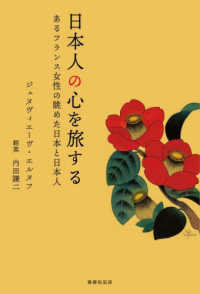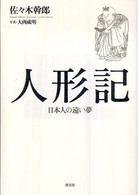- ホーム
- > 洋書
- > 英文書
- > History / World
Full Description
Weaving together chapters on imperial Japan's wartime mobilization, Asia's first wave of postwar decolonization, and Cold War geopolitical conflict in the region, Engineering Asia seeks to demonstrate how Asia's present prosperity did not arise from a so-called 'economic miracle' but from the violent and dynamic events of the 20th century. The book argues that what continued to operate throughout these tumultuous eras were engineering networks of technology. Constructed at first for colonial development under Japan, these networks transformed into channels of overseas development aid that constituted the Cold War system in Asia.
Through highlighting how these networks helped shape Asia's contemporary economic landscape, Engineering Asia challenges dominant narratives in Western scholarship of an 'economic miracle' in Japan and South Korea, and the 'Asian Tigers' of Southeast Asia. Students and scholars of East Asian studies, development studies, postcolonialism, Cold War studies and the history of technology and science will find this book immensely useful.
Contents
1. Introduction: A Kula Ring for the Flying Geese: Japan's Technology Aid and Postwar Asia, Hiromi Mizuno (University of Minnesota, USA)
Part 1: Engineering Asia at Home - Japan's Institutional Infrastructure for Asian Development
2. Tokyo's Vision of Southeast Asia: Private Interests and Economic Cooperation in the 1950s, Jin Sato (University of Tokyo, Japan)
3. Itagaki Yoichi and the Formation of the Postwar Knowledge Infrastructure for Japan's Overseas Development Assistance in Asia, Masato Karashima (Kobe University, Japan)
Part 2: Engineering Asia on the Ground
4. From 'Constructing' to 'Developing' Asia: Japanese Engineers and the Formation of the Post-Colonial, Cold War Discourse of Development in Asia, Aaron S Moore (Arizona State University, USA)
5. The Hydrocarbon Ring: Indonesian Fossil Fuel, "Japanese Cooperation," and American Neo-Imperialism, 1941-1975, Eric Dinmore (Hampden-Sydney College, USA)
6. Colonial Seeds and Imperialist Genes: Japanese Colonial Agricultural Development and the Cold-War Green Revolution, Tatsushi Fujihara (Kyoto University, Japan)
Part 3: South Korea - Engineering Asia as a Developing Nation
7. Postcolonial Desire and the Tripartite Alliance in East Asia: the Hybrid Origins of a Modern Scientific and Technological System in South Korea, Manyong Moon, (Chonbuk National University, South Korea)
8. Making Miracle Rice: Tongil and Mobilizing a Domestic "Green Revolution" in South Korea,
Tae-ho Kim, (Chonbuk National University, South Korea)
9. In Pursuit of "Peace and Construction": Hyundai Construction and Infrastructure in Southeast Asia, 1965-1973, John P DiMoia, (Seoul National University, South Korea)







